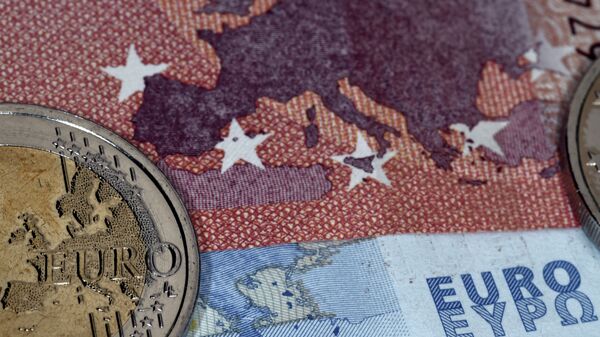Kristian Rouz – In spite of all the global anxiety resulting from emerging market turbulence, the Eurozone’s measure of economic confidence unexpectedly jumped to a four-year high of 105.6 in September. Previously, the consensus forecast was 104.1. The Eurozone’s economy is accelerating due to the industrial and services boom, now happening in Germany and Italy, partially resulting from the European Central Bank’s (ECB) accommodative policies. Meanwhile, as the upbeat figures arrive, Germany stopped issuing bonds, even though the nation’s budget is burdened by the sudden spending on refugees.
The index of executive and consumer confidence rose to 105.6 for the outgoing month compared to the final reading of 104.1 for August, according to European Commission data. Economic confidence in the common currency area has surpassed its June 2011 level it was at just before the debt crisis unraveled across the bloc.
The data indicates the negligible impact of global headwinds to the European economy. Even though mainland China and major commodity-producing nations are struggling amidst the overproduction crisis, consumption in advanced nations is accelerating – mainly due to persisting low prices. Weak inflation, however, is a concern for the Eurozone as cheap energy and raw materials hold down the core prices index, thus slowing the broader growth.
The European monetary authorities are thus far taking the global headwinds more seriously as the ECB recently downgraded its growth and inflation outlook through to September 2017. The accommodative asset-purchasing policies have been intact for half a year already, and are expected to wrap up in September 2016. The results of the ECB work are so far very encouraging, but global uncertainty still lingers. The Eurozone is exposed to risks in many emerging markets through their links in international trade, while the Transatlantic Trade and Investment Partnership (TTIP) with the US is yet to be finalized.
According to the Eurocommission, industrial sentiment improved from —3.7 to —2.2 amidst the increasing factory output. The Eurozone’s services sector confidence rose from 10.1 to 12.4 as consumer demand is accelerating and prices are low.
Meanwhile, Germany stopped bond issuance for the second time this year amidst economic optimism and a significant trade surplus, even though the nation plans to spend some $7.5 bln to help 1 mln asylum seekers.
Most macro indicators are favourable for Germany at the moment, allowing it to easily lead and determine the direction of growth in the entire Eurozone. German interest rates are low, unemployment is at a historic low leaving the labour market starved of employees, whilst tax revenues surpassed earlier projections.
The time has come for Germany to reduce its debt burden. Berlin paid off 1.1% of its federal debt to the current 1.3 trln euros in the second quarter. Debts of all government agencies in Germany stand at 2 trln euros, some 0.9% below last year's level.
With the Eurozone’s economy gaining further momentum and millions of refugees projected to join the bloc’s workforce, there is more optimism in medium-tern projections for Brussels. Overseas spillovers might only impact the bloc’s inflation, limiting growth outlook, and affect the structure of the Eurozone’s international trade, bringing the overproduction crisis to Europe.



